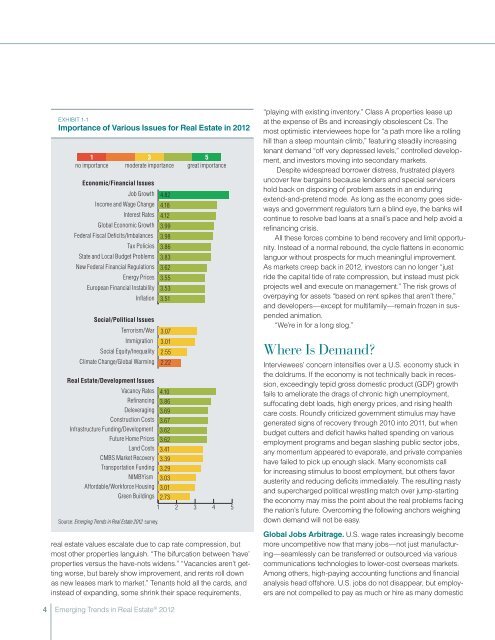Emerging Trends in Real Estate 2012 - Urban Land Institute
Emerging Trends in Real Estate 2012 - Urban Land Institute
Emerging Trends in Real Estate 2012 - Urban Land Institute
You also want an ePaper? Increase the reach of your titles
YUMPU automatically turns print PDFs into web optimized ePapers that Google loves.
Exhibit 1-1<br />
Importance of Various Issues for <strong>Real</strong> <strong>Estate</strong> <strong>in</strong> <strong>2012</strong><br />
1<br />
no importance<br />
3<br />
moderate importance<br />
Economic/F<strong>in</strong>ancial Issues<br />
Job Growth<br />
Income and Wage Change<br />
Interest Rates<br />
Global Economic Growth<br />
Federal Fiscal Deficits/Imbalances<br />
Tax Policies<br />
State and Local Budget Problems<br />
New Federal F<strong>in</strong>ancial Regulations<br />
Energy Prices<br />
European F<strong>in</strong>ancial Instability<br />
Inflation<br />
Social/Political Issues<br />
Terrorism/War<br />
Immigration<br />
Social Equity/Inequality<br />
Climate Change/Global Warm<strong>in</strong>g<br />
<strong>Real</strong> <strong>Estate</strong>/Development Issues<br />
Vacancy Rates<br />
Ref<strong>in</strong>anc<strong>in</strong>g<br />
Deleverag<strong>in</strong>g<br />
Construction Costs<br />
Infrastructure Fund<strong>in</strong>g/Development<br />
Future Home Prices<br />
<strong>Land</strong> Costs<br />
CMBS Market Recovery<br />
Transportation Fund<strong>in</strong>g<br />
NIMBYism<br />
Affordable/Workforce Hous<strong>in</strong>g<br />
Green Build<strong>in</strong>gs<br />
Source: <strong>Emerg<strong>in</strong>g</strong> <strong>Trends</strong> <strong>in</strong> <strong>Real</strong> <strong>Estate</strong> <strong>2012</strong> survey.<br />
4.82<br />
4.18<br />
4.12<br />
3.99<br />
3.98<br />
3.86<br />
3.83<br />
3.62<br />
3.55<br />
3.53<br />
3.51<br />
3.07<br />
3.01<br />
2.55<br />
2.22<br />
4.10<br />
3.86<br />
3.69<br />
3.67<br />
3.62<br />
3.62<br />
3.41<br />
3.39<br />
3.29<br />
3.03<br />
3.01<br />
2.73<br />
5<br />
great importance<br />
1 2 3 4 5<br />
real estate values escalate due to cap rate compression, but<br />
most other properties languish. “The bifurcation between ‘have’<br />
properties versus the have-nots widens.” “Vacancies aren’t gett<strong>in</strong>g<br />
worse, but barely show improvement, and rents roll down<br />
as new leases mark to market.” Tenants hold all the cards, and<br />
<strong>in</strong>stead of expand<strong>in</strong>g, some shr<strong>in</strong>k their space requirements,<br />
“play<strong>in</strong>g with exist<strong>in</strong>g <strong>in</strong>ventory.” Class A properties lease up<br />
at the expense of Bs and <strong>in</strong>creas<strong>in</strong>gly obsolescent Cs. The<br />
most optimistic <strong>in</strong>terviewees hope for “a path more like a roll<strong>in</strong>g<br />
hill than a steep mounta<strong>in</strong> climb,” featur<strong>in</strong>g steadily <strong>in</strong>creas<strong>in</strong>g<br />
tenant demand “off very depressed levels,” controlled development,<br />
and <strong>in</strong>vestors mov<strong>in</strong>g <strong>in</strong>to secondary markets.<br />
Despite widespread borrower distress, frustrated players<br />
uncover few barga<strong>in</strong>s because lenders and special servicers<br />
hold back on dispos<strong>in</strong>g of problem assets <strong>in</strong> an endur<strong>in</strong>g<br />
extend-and-pretend mode. As long as the economy goes sideways<br />
and government regulators turn a bl<strong>in</strong>d eye, the banks will<br />
cont<strong>in</strong>ue to resolve bad loans at a snail’s pace and help avoid a<br />
ref<strong>in</strong>anc<strong>in</strong>g crisis.<br />
All these forces comb<strong>in</strong>e to bend recovery and limit opportunity.<br />
Instead of a normal rebound, the cycle flattens <strong>in</strong> economic<br />
languor without prospects for much mean<strong>in</strong>gful improvement.<br />
As markets creep back <strong>in</strong> <strong>2012</strong>, <strong>in</strong>vestors can no longer “just<br />
ride the capital tide of rate compression, but <strong>in</strong>stead must pick<br />
projects well and execute on management.” The risk grows of<br />
overpay<strong>in</strong>g for assets “based on rent spikes that aren’t there,”<br />
and developers—except for multifamily—rema<strong>in</strong> frozen <strong>in</strong> suspended<br />
animation.<br />
“We’re <strong>in</strong> for a long slog.”<br />
Where Is Demand<br />
Interviewees’ concern <strong>in</strong>tensifies over a U.S. economy stuck <strong>in</strong><br />
the doldrums. If the economy is not technically back <strong>in</strong> recession,<br />
exceed<strong>in</strong>gly tepid gross domestic product (GDP) growth<br />
fails to ameliorate the drags of chronic high unemployment,<br />
suffocat<strong>in</strong>g debt loads, high energy prices, and ris<strong>in</strong>g health<br />
care costs. Roundly criticized government stimulus may have<br />
generated signs of recovery through 2010 <strong>in</strong>to 2011, but when<br />
budget cutters and deficit hawks halted spend<strong>in</strong>g on various<br />
employment programs and began slash<strong>in</strong>g public sector jobs,<br />
any momentum appeared to evaporate, and private companies<br />
have failed to pick up enough slack. Many economists call<br />
for <strong>in</strong>creas<strong>in</strong>g stimulus to boost employment, but others favor<br />
austerity and reduc<strong>in</strong>g deficits immediately. The result<strong>in</strong>g nasty<br />
and supercharged political wrestl<strong>in</strong>g match over jump-start<strong>in</strong>g<br />
the economy may miss the po<strong>in</strong>t about the real problems fac<strong>in</strong>g<br />
the nation’s future. Overcom<strong>in</strong>g the follow<strong>in</strong>g anchors weigh<strong>in</strong>g<br />
down demand will not be easy.<br />
Global Jobs Arbitrage. U.S. wage rates <strong>in</strong>creas<strong>in</strong>gly become<br />
more uncompetitive now that many jobs—not just manufactur<strong>in</strong>g—seamlessly<br />
can be transferred or outsourced via various<br />
communications technologies to lower-cost overseas markets.<br />
Among others, high-pay<strong>in</strong>g account<strong>in</strong>g functions and f<strong>in</strong>ancial<br />
analysis head offshore. U.S. jobs do not disappear, but employers<br />
are not compelled to pay as much or hire as many domestic<br />
4 <strong>Emerg<strong>in</strong>g</strong> <strong>Trends</strong> <strong>in</strong> <strong>Real</strong> <strong>Estate</strong> ® <strong>2012</strong>




